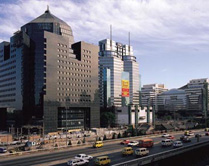 The Chinese economy registered a growth rate of 8.2 percent for the first half of 2003. The blistering pace is pleasing, but members of China's top lawmaking body are warning of possible risks, as domestic consumption drops and the employment outlook seem uncertain. They raised their concerns at a meeting of the Financial and Economic Working Committee of the NPC.
The Chinese economy registered a growth rate of 8.2 percent for the first half of 2003. The blistering pace is pleasing, but members of China's top lawmaking body are warning of possible risks, as domestic consumption drops and the employment outlook seem uncertain. They raised their concerns at a meeting of the Financial and Economic Working Committee of the NPC.
Despite the Iraq war and SARS, China's economic growth hit 8.2 percent for the first half of this year. Economists and government officials affirmed central government policies that helped achieving the results. But they warned of possible risks.
Lin Zhaomu, member of Financial & Economic Committee of NPC Standing Committee, said, "The pace of growth is important, but it is not the only parameter. I think now the development of the whole economic structure is uneven. Due to SARS, the service sector staggered, the growth rate of people's income dropped. The situation with employment and rural income has been exacerbated. All three areas are our weak points, and they are now getting worse."
Participants believe it is dangerous that infrastructure investment has become the major driver of economic growth while domestic consumption remains sluggish.
He Keng, the former Deputy Director of National Bureau of Statistics, said, " We should limit infrastructure construction and try to boost domestic consumption. China's domestic consumption ratio is 20 percent less than the world average. And the figure is still dropping. This is a dangerous trend."
In 2001, the consumption ratio was 46.5% -- in 2002, 45.2%. And He Keng says the percentage will shrink again this year as SARS-led uncertainties drive residents to tighten their purse strings further.
Zhou Zhengqing, former chief of the China Securities Regulatory Commission also noted problems in the financial sector. He said that though total loans outstanding has surged, rural areas and SMES are still finding it hard to obtain financing.
"SMES always find difficult to get loans. 66.5% of SMES report difficulties in getting loans. Yet SMES are the key drivers of employment opportunities. So this is a major concern." He also pointed out that China's relatively small proportion of direct financing will increase the financial risks in the capital market.
(CCTV July 17, 2003)
|

